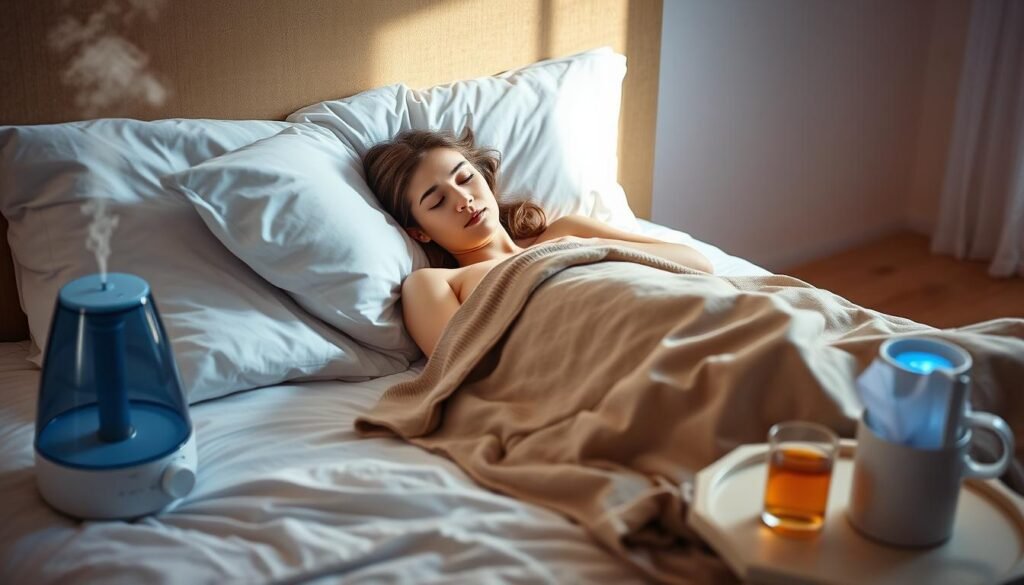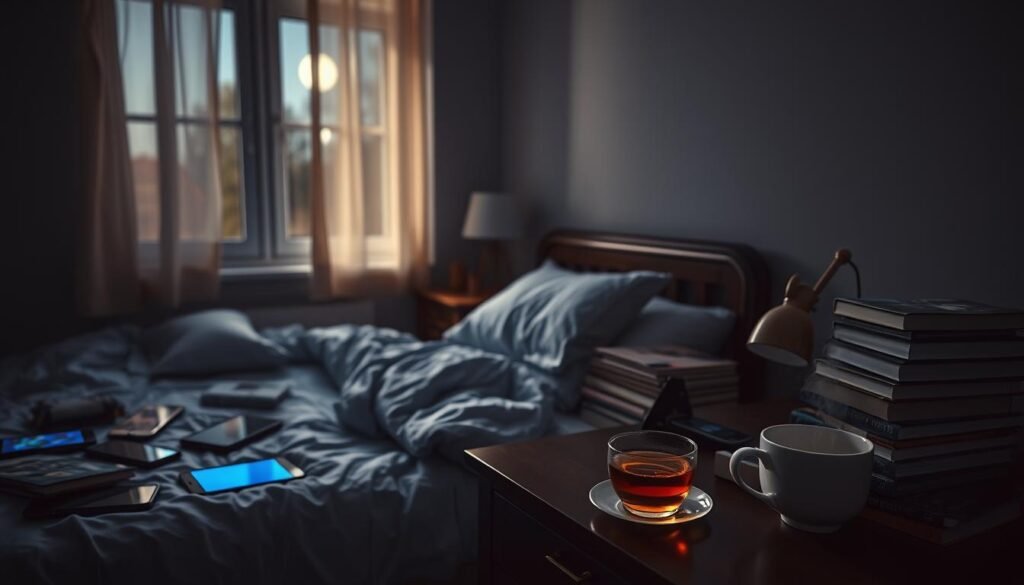Did you know that nearly 30% of people with a cold report having insomnia? Symptoms like congestion, a sore throat, and coughing make it hard to fall asleep. Because we need good sleep to get better, it’s crucial. This guide offers practical tips for those sick nights. You’ll find advice on home remedies, over-the-counter meds, and lifestyle changes to sleep better with a cold. For more tips, check out how to sleep with a cold.
Key Takeaways
- Approximately 30% of individuals with a cold face insomnia due to symptom disruptions.
- Over 50% find relief by using humidifiers or vaporizers to combat nighttime discomfort.
- Gargling with warm salt water can quickly soothe a sore throat for 40% of users.
- Elevating the head during sleep is recommended to enhance breathing and comfort.
- Maintaining a cool, dark, and quiet sleep environment fosters better rest.
Understanding Insomnia During Illness
Getting sick can really mess up your sleep, leading to a cycle that slows down recovery. Things like a stuffy nose, fever, and cough can make sleep hard. This is because of disturbed sleep pattern due to cold symptoms. Research shows that people with colds often struggle with sleep. In fact, about 75% of cold sufferers experience insomnia. This shows the link between getting sick and poor sleep quality during respiratory infection.
Getting sick triggers an immune response that can mess with sleep. Fighting off illness can mess up your sleep pattern. This can make you feel tired even after a long sleep. Feeling tired all day can make you feel worse, keeping the cycle of insomnia going.
It’s important to notice sleep problems when you’re sick. Insomnia can affect your mood and focus and slow down your recovery. If you’re dealing with insomnia as a symptom of illness, finding ways to sleep better is key. Doing so helps both your body and mind heal.
The Importance of Sleep for Recovery
Quality sleep is key to getting better from illnesses, especially with colds. When fighting an infection, our bodies need good sleep. Adequate sleep boosts our immune system by making more cytokines and antibodies.
Adults need seven to eight hours of sleep to keep their immune system strong. Kids and teens need even more sleep, about nine to ten hours. Getting enough sleep doesn’t only keep you from getting sick; it also helps you recover faster when you do.
Sleep deprivation has shocking effects. People who sleep less than seven hours are nearly three times likelier to catch a cold. Those with less than 92% sleep efficiency have a higher chance of getting sick. This shows how crucial sleep is for a strong immune defense.
Not getting enough sleep weakens the immune system. This leads to fewer natural killer cells, less cytokine production, and more inflammation. Over time, lack of sleep can cause serious issues like obesity and heart disease. So, it’s important to sleep well, especially during the cold season or when sick.
In short, how much and how well you sleep greatly affects your health. Knowing how sleep helps the immune system is important for staying healthy.
Causes of Sleeplessness During Illness
When you’re sick, it’s tough to sleep, and knowing why is important. Symptoms of illness can badly affect how well you sleep. For example, having a common cold comes with many discomforts. These discomforts can wake you up or stop you from falling asleep.
Common Cold Symptoms Affecting Sleep
Certain symptoms of a common cold make sleeping hard. These include:
- Coughing: If you keep coughing, it might wake you up, and then getting back to sleep can be tough.
- Nasal Congestion: When your nose is blocked, breathing becomes difficult. This might make you change positions often to breathe easier.
- Body Aches: Pain can stop you from relaxing well enough to sleep deeply.
- Sore Throat: If it hurts to swallow, finding a comfy way to lie down and sleep can be hard.
How Illness Disrupts Sleep Patterns
Being sick changes more than just causing symptoms; it messes with the quality of your sleep. The way your body fights the infection leads to changes in how you sleep, like:
- Lighter Sleep: You might find yourself waking up more or having a lighter sleep than usual.
- Frequent Awakenings: Things like coughing, hard breathing, or needing to get out of bed can break your sleep over and over.
- Residual Fatigue: Not sleeping well at night means you feel more tired during the day. This can make getting better take longer.
Paying attention to these symptoms can lead to ways to cope with sleep problems when sick. This can help make those restless nights a bit easier to handle.
Effective Home Remedies for Better Sleep
Looking for ways to beat insomnia when you have a cold? This can really help you feel better and sleep more. Home remedies are easy fixes to calm symptoms and help you rest. Two key ways are drinking warm beverages before bed and gargling with salt water.
Warm Beverages to Soothe Symptoms
Drinking warm liquids can be cozy at night, especially if you’re sick. Herbal teas like chamomile or peppermint can soothe your throat and clear congestion. Warm broth or herbal drinks keep you hydrated and fight off cold symptoms. The warmth helps you relax, making sleep come easier. Try warm drinks at bedtime as a natural way to get better sleep and recover faster.
Benefits of Gargling with Salt Water
Gargling with salt water is a trusted method for easing a sore throat. It reduces swelling and eases pain, leading to better sleep. Just mix half a teaspoon of salt in a glass of warm water for an easy solution. Gargling helps soothe throat irritation and reduces coughing at night, which often makes it hard to sleep. Using salt water gargling can improve your sleep when you’re sick.

Over-the-Counter Medications for Cold Symptoms
When you can’t sleep because of a cold, over-the-counter drugs can be a huge help. They tackle the symptoms that keep you awake. This means you can get relief from coughing at night and sleep better.
There are many medicines available, each aimed at specific cold problems.
Nasal Decongestants
Stuffiness can make it hard to breathe and sleep. Drugs like pseudoephedrine, found in Sudafed, are popular for getting rid of it. Studies show they work well for blocked noses.
But they can also cause side effects like anxiety and high blood pressure. It’s best not to use them for too long.
Cough Medicines for Nighttime Relief
Cough suppressants are key for handling coughs. Dextromethorphan is in many cough remedies. It helps stop coughs that disturb your sleep.
But be careful with how much you use. Too much can cause serious problems. For coughs at night, adding Mucinex can help. It thins mucus, making coughs more effective.
| Medication Type | Common Brands | Active Ingredient | Key Effects | Side Effects |
|---|---|---|---|---|
| Nasal Decongestants | Sudafed | Pseudoephedrine | Relieves nasal congestion | Insomnia, anxiety, dizziness |
| Cough Suppressants | Robitussin, Delsym | Dextromethorphan | Suppresses cough reflex | Hypertension, dizziness |
| Expectorants | Mucinex | Guaifenesin | Thins mucus | Nausea, vomiting |
| NSAIDs | Tylenol, Advil | Acetaminophen, Ibuprofen | Reduces fever and pain | Stomach upset, liver damage (high doses) |
| Antihistamines | Benadryl, Claritin | Diphenhydramine, Loratadine | Relief from sneezing/runny nose | Drowsiness (Benadryl), dry mouth |
Choosing suitable over-the-counter drugs for cold-related insomnia matters. Being aware of side effects helps ensure safe use. This way, you can sleep well even when sick.
Sleep Positioning Tips for Improved Rest
Finding the right sleep position helps comfort when you’re sick. Adjusting your position can clear congestion and let your body rest better. Try propping up your head and chest. This can reduce coughing from sinus issues or colds.
Using Pillows to Elevate Your Head
Extra pillows or a wedge pillow can help a lot. They keep your head elevated, cutting down on postnasal drip and coughing at night. This is good for people with seasonal respiratory viruses. It’s a smart way to make your sleep more comfortable when you’re sick. The elevation soothes your throat and lungs, improving sleep quality.
Creating a Comfortable Sleeping Environment
A calm bedroom is key for good sleep, especially when sick. To make your sleep space comfy while ill, think about these:
- Keep the bedroom cool, around 65 to 68 degrees Fahrenheit, to help with congestion.
- Choose soft, breathable bedding for better comfort and relaxation.
- Reduce noise and light to make your bedroom more peaceful.
- Consider using humidifiers or vaporizers to moisten the air, which may relieve congestion.
Making these adjustments can greatly increase your chances of restful sleep while sick. Looking into more tips on home remedies can further help sleep health during illness. For more ideas, visit this link.

Essential Lifestyle Adjustments
Making small changes in your lifestyle can improve how well you sleep with a cold. These changes help you recover faster and sleep better.
Avoiding Alcohol Before Bedtime
Even though alcohol might seem good for relaxing, it’s bad for your sleep. It causes you to wake up often and sleep lightly, hindering recovery from a cold. Not drinking alcohol before bed leads to deeper, more healing sleep, a must when you’re sick.
Maintaining a Cool Bedroom Temperature
A cool bedroom is key for good sleep. Keep it between 65 to 68 degrees Fahrenheit for the best rest. This cool environment lets your body follow its natural sleep patterns, resulting in deeper sleep. Ensuring your room is well-ventilated and your bedding is cozy can make your sleep environment calm, aiding your recovery from a cold.
| Age Group | Recommended Sleep Hours |
|---|---|
| 0–3 months | 14–17 hours including naps |
| 4–11 months | 12–16 hours including naps |
| 1–2 years | 11–14 hours including naps |
| 3–5 years | 10–13 hours including naps |
| 6–12 years | 9–12 hours |
| 13–18 years | 8–10 hours |
| 18–64 years | 7–9 hours |
| 65 and older | 7–8 hours |
Using Humidifiers and Vaporizers
Humidifiers improve breathing comfort while sleeping, especially in cold, dry weather. Optimal humidity helps soothe discomfort from dry air that worsens respiratory symptoms. Keeping humidity between 30-50% also helps reduce dry skin, sinus problems, and snoring.
How Humidity Affects Respiratory Comfort
High humidity stops germs in the air from surviving long, cutting down sickness spread. In cold months, indoor air gets dry from heating, leading to runny noses and sore throats. Humidifiers ensure comfort and healthier breathing for better sleep.
Best Practices for Using Humidifiers
To get the most out of humidifiers, follow these tips:
- Choose a cool mist humidifier for safety, especially around kids and pets.
- Pick ultrasonic humidifiers for silent operation and a soothing sleep sound.
- Use distilled water to stop bacteria from growing.
- Clean your humidifier often to keep it free from allergens.
- Keep humidity levels between 40% and 60% for comfortable, healthy breathing while sleeping.
Sticking to these guidelines makes humidifiers great for better air quality and sleep when sick. Regular cleaning also boosts sleep comfort by keeping the sleeping area healthy and cozy.
Dealing with Interrupted Sleep When Unwell
Having your sleep interrupted by illness is tough and can slow down your recovery. It’s important to find effective ways to deal with this for better health. A calming bedtime routine helps your body get ready for sleep, making illness easier to deal with.
Establishing a Relaxing Bedtime Routine
Making a soothing atmosphere before bed helps a lot. Relaxing activities before sleeping calm worries and get the body ready for rest. Here are a few tips:
- Dim the lights to tell your body it’s time to relax.
- Do some gentle stretching or meditation to let go of stress.
- Take a warm bath to feel relaxed and comfy.
- Read a book or listen to soothing music to forget about your symptoms.
How to Manage Coughing Fits at Night
Coughing a lot at night can make it hard to sleep. But, there are ways to make it better. Try these steps:
- Drink warm liquids like herbal tea or broth before bed to stay hydrated.
- Use honey to help stop coughing.
- Keep tissues and cough drops close for when you need them.
- Sleep with your head raised to cough less.
Focusing on a good bedtime routine and dealing with sleep interruptions from being sick helps with getting good rest. Even when you’re not feeling your best, these strategies can make a big difference.
Digital Distractions: Keeping Devices Away
In today’s world, sleep and digital habits are linked. Using smartphones before bed can change how we sleep. This is because of the blue light emitted and the mental activity from using screens. Research shows these habits can harm our health, disturbing vital sleep stages.
The Impact of Screens on Sleep Quality
Smartphones emit blue light which disrupts our natural sleep cycles. This disruption affects our deep sleep and REM sleep, which are important for healing. The National Sleep Foundation suggests stopping using devices 30 minutes before sleeping. Alerts from our phones can also break into our sleep, making good rest hard to achieve.
Creating a Tech-Free Sleep Zone
For better sleep, it’s key to have a place without gadgets. Here are some tips to help you relax:
- Leave smartphones outside the bedroom to discourage midnight checks.
- Turn notifications to silent mode before bedtime.
- Incorporate calming activities such as reading or meditating instead of using devices.
- Encourage a consistent bedtime routine to signal the body it’s time to wind down.

By making these changes, your sleep quality can improve, which is crucial when you’re sick or need rest. A calm mind leads to better rest, which supports a healthier life.
Insomnia With a Cold: When to Seek Help
Feeling awake when you’re sick is both tiring and frustrating. Knowing when to get help for insomnia during a cold is key to get better. It’s key to watch your symptoms closely. This helps you see if they’re getting better or worse. Paying attention to warning signs can help you decide when to see a doctor.
Recognizing When Symptoms Worsen
A common cold brings a runny nose, cough, sore throat, and feeling tired. These might seem like small issues at first. But it’s important to notice if things start getting worse. If your stuffy nose lasts more than a week, or if you get a high fever or can’t stop coughing, you should see a doctor. Also, if you can’t sleep well for over a month, despite trying to fix it on your own, it could be a bigger problem. Long-term sleep problems can really impact your life, so knowing when to address these signs is key.
Consulting a Healthcare Professional
If your symptoms get worse or don’t get better, it’s time to talk to a doctor. They’ll look at what’s happening, offer treatments that suit you, and help ease your worries about other health issues. It’s important to deal with ongoing insomnia, especially if it stops you from living your life fully. Treatments like Cognitive Behavioral Therapy for Insomnia (CBT-I) and proper check-ups can help overcome these difficulties. Resources like this guide also provide more ideas on how to manage sleep issues when you’re sick.
| Symptoms | When to Seek Help |
|---|---|
| Persistent high fever | Contact a healthcare professional after a few days |
| Severe coughing fits | Consult if it disrupts sleep and daily routine |
| Nasal congestion lasting over a week | Seek assistance to explore treatment options |
| Worsening insomnia | Schedule an evaluation if it lasts more than a month |
| Daytime sleepiness affecting functionality | Talk to a professional about potential underlying issues |
Conclusion
Managing a cold with insomnia needs you to tackle both the sickness and sleep issues. Warm drinks and humidifiers can make a big difference. They help you feel better and sleep well. Taking steps early can help you sleep better at night, despite having a cold.
If sleep problems keep happening, it’s important to seek help. Around 10% of adults face chronic insomnia, often with other health issues. Advice from experts is key if sleep gets worse. A bedtime routine without tech can help a lot. It can make your sleep deeper and help you recover quicker.
A cold can really mess up our sleep, as many know all too well. Research shows that many people with colds can’t sleep well for a short time. Knowing what to do and using good solutions is key. These actions help improve sleep, especially when you’re sick with a cold.